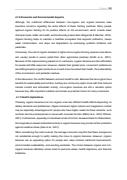P a g e | 33 4.1.6 Economic and Environmental Aspects Although, the nutritional differences between non-organic and organic bananas raise important concerns regarding the wider effects of these farming practices. Many people applaud organic farming for its positive effects on the environment, which include lower chemical inputs, better soil health, and biodiversity preservation (Reganold & Wachter, 2016). Organic farming helps to maintain a healthier ecosystem that supports pollinators, lowers water contamination, and stops soil degradation by eschewing synthetic fertilisers and pesticides. Conversely, the cost of organic bananas is higher since organic farming requires more labour and usually results in poorer yields than other agricultural practices (Smith et al., 2021). Because of this expense being passed on to customers, organic bananas are less affordable for people with little resources. However, despite their greater price, consumers' preferences are shifting towards organic products as a result of worries about their health, the sustainability of the environment, and pesticide residues. In this discussion, the conflict between cost and benefit is vital. Bananas that are organic have benefits for sustainability and nutrition, but they are not the only option. Even with their reduced mineral content and antioxidant activity, non-organic bananas are still a sensible option because they offer important nutrients and remain as practical choice for many consumers. 4.1.7 Health Implications Choosing organic bananas over non-organic ones has different health effects depending on dietary demands and preferences. Organic bananas' higher calcium and magnesium content may be especially advantageous for people who have higher needs for these nutrients, such as those who have osteoporosis or issues with muscular function (Milton et al., 2023; Pittman, 2021). Furthermore, especially in individuals at risk of chronic diseases linked to inflammation, the marginally increased antioxidant activity in organic bananas may provide further protection against oxidative stress (Sies et al., 2021). When considering the costs involved, the average consumer may find that these changes are not substantial enough to justify making the move to organic bananas. However, organic bananas are an appealing option for people who value minimal nutritional improvements, environmental sustainability, and avoiding pesticides. The choice between organic and non- organic bananas ultimately comes down to personal values, health objectives, and financial limitations.
